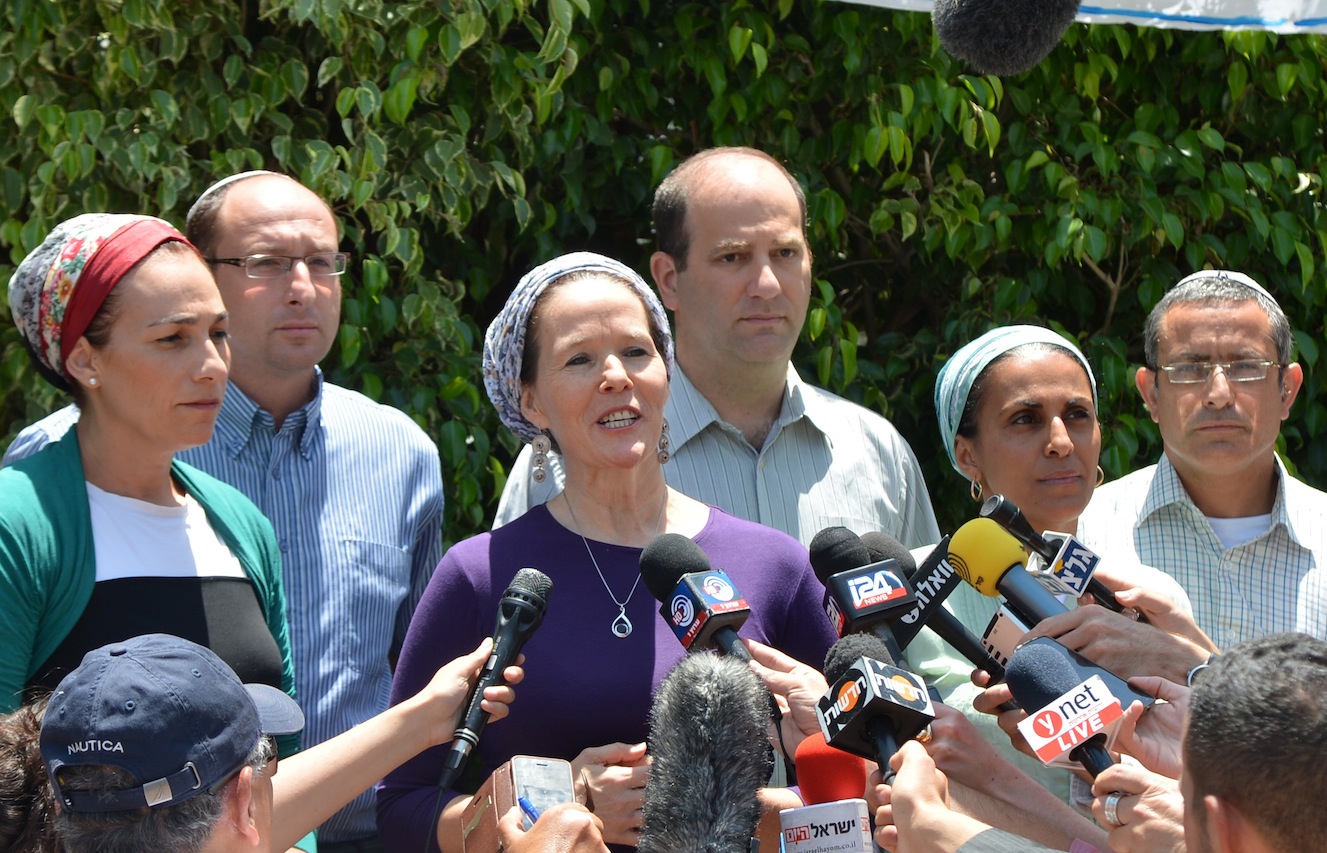KARNEI SHOMRON, West Bank (JTA) — Four days into the search for three kidnapped Israeli teens, I attended a group prayer session dedicated to their safe return.
Dozens of women gathered together to read responsively psalms seeking God’s mercy and intervention before the start of our morning Jewish studies classes. Our voices broke as we prayed for the boys’ safe return, though most of us do not know the families personally.
I returned home to find my teenage daughter, who is about the same age as two of the boys and should be studying for finals, preparing to perform special mitzvot to help bring them home. My teenage son returned home from school and immediately ran off to participate with the community’s youth in special prayers on behalf of the captives.
It is amazing how quickly the rhythm of our lives and our daily schedules has begun to revolve around the three teens, including one dual Israeli-American citizen, who were kidnapped by Palestinian terrorists while trying to get rides home from a junction in Gush Etzion, a bloc of settlements located south of Jerusalem.
Since the abduction of Gilad Shaar, Eyal Yifrach and Naftali Frenkel, we are all checking news sources from the Web earlier and more often on our computers at work or on our phones. Even my younger children have been coming home from school and turning on the television news instead of their usual Nickelodeon. Not that some SpongeBob wouldn’t do us all some good.
I have not slept well since the boys were discovered kidnapped, and it is clear to me that none of my neighbors and friends here in Israel have either, if the times stamped on their Facebook posts are any indication. We ask each other for updates at the supermarket, at exercise class, at school pickup. We talk about our fears for the boys around the Shabbat table and at the “makolet,” or corner store. We curse their kidnappers as we pick up the kids from the pool and at the library.
We are living and breathing their captivity while also going about our daily lives. We simply must.
One of the day-to-day aspects of living here that has continued is that the residents of my community, located in the northern West Bank halfway between Qalqilya and Nablus, continue to “tremp,” or hitchhike, to get around.
Some in the Israeli media have been portraying tremping as a settler phenomenon in which those who hitchhike can show their ownership over all places in Israel and their brotherhood with all Israelis. But, in fact, for most of our kids, tremping is simply a means of getting from place to place without waiting hours and hours for buses that run infrequently and do not always arrive. And it occurs not only in the West Bank but in many areas of Israel’s periphery.
After a Shabbat of anxiety over the fate of the three boys, my oldest daughter left to return to her apartment in the southern Israeli city of Ashkelon, where she is performing her second year of national service. She tremped to the train station near Rosh Haayin in central Israel. My husband and I do not allow my other children to tremp. However, my oldest daughter is nearly 20, an adult who has to make her own decisions. She was not alone in deciding to continue to tremp.
For me the place where the boys were kidnapped also holds a significant resonance. That same daughter performed her first year of national service in several communities in Gush Etzion. Every Thursday night for a year she stood at the same junction where the three boys were abducted as she waited for a ride to get her home. It could have been her.
But right now, the kidnapped teens are the sons of all of us. We wait, we pray, we cry. We figuratively embrace their brave mothers who each have spoken to us through the media, their faces alight with hope and faith that their sons will be returned to them.
And we pray that our own children will be safe. I was on the phone Sunday night with my daughter in Ashkelon when she heard the Iron Dome anti-missile system intercept two rockets fired from the Gaza Strip.
I had called her because the Code Red alert app on my smartphone had sounded and I wanted to make sure that she had made it to the stairwell of her apartment building, which is not equipped with a bomb shelter. I put the app on my phone, which alarms in real time, out of an obsessive desire to know whether or not she is safe at all times. But it is clear that we can never be assured of that.
JTA has documented Jewish history in real-time for over a century. Keep our journalism strong by joining us in supporting independent, award-winning reporting.






